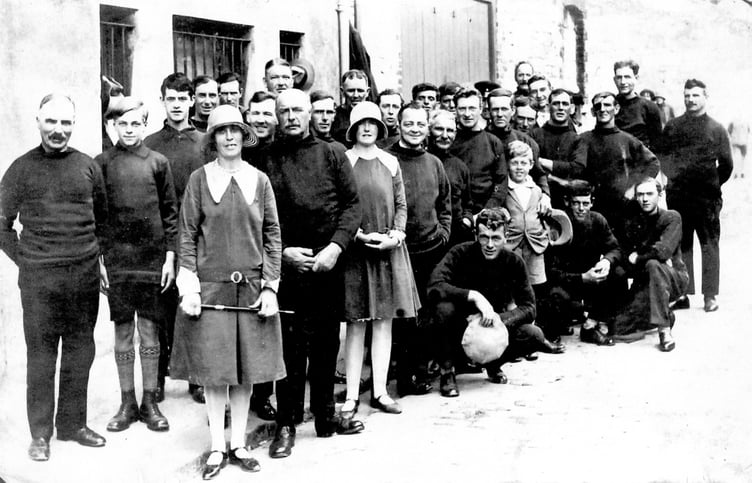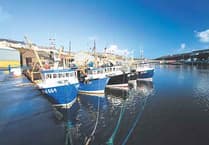By David Lashbrooke
This year marks 100 years since Polperro Fishermen’s Choir was formed by the fishermen who sang while they worked.
A lot happened in 1923. The future King George VI married Lady Elizabeth Bowes-Lyon, the future Queen Mother, in Westminster Abbey. The Postmaster General granted the BBC a licence to broadcast, Littlewoods football pools were started, and the first Le Mans 24 hour race was held in France. Time Magazine was launched, King Tutankhamun’s burial chamber was opened, and the cricketer Jack Hobbs scored his 100th century. Warner Brothers established their film studio in Hollywood, and ‘Yes, We Have No Bananas’ was a hit song of the year. Meanwhile in Polperro, a quiet little village by the sea which might have just half a dozen visitors on a sunny afternoon, Polperro Fishermen’s Choir was formed.
One of the oldest male voice choirs in Cornwall, Polperro Fishermen’s Choir was unusual because of its two founders: Eva Cloke and Tommy Mark. In the days before electronic navigation aids, the fishermen depended on their seamanship and their faith in God to keep them safe so they would often sing hymns as they worked. Eva Cloke was the wife of a fisherman and was influential in persuading the singers to form a choir to preserve the tradition, possibly inspired by the visits of the Holman Male Voice Choir from Redruth, raising money for the unemployed such as tin miners. Eva was the organist at the Methodist chapel and, because she had the musical ability to coach the men to sing in harmony, the newly formed Polperro Fishermen’s Choir became the first to have a female conductor. In January 1930, a newspaper reported that Eva ‘has ‘remarkable control over these sturdy sons of the sea’.
The importance of Tommy Mark to the choir should also not be underestimated. He had been a Polperro fisherman before turning to lay preaching, when he became known as the Fishermen’s Bishop. He blended religion and the sea in his homilies and the Cornish Guardian reported that he gave his evangelical addresses ‘in his customary breezy but intensely sincere manner’. His sermons attracted large crowds, sometimes well over 1000 people, to the combined services and religious concerts given by the choir. Newspapers reported that a 1928 concert in the Devonport Central Hall had a congregation of about 1,500 with many more unable to get in. Such was the fame of the choir and Tommy Mark at the time that a report and photograph appeared in The Sphere, published in London as ‘The Empire’s Illustrated Weekly’. By contrast, the local press reported another well-attended sacred concert in Mevagissey below the far more important news that Mr Harry Tregaskes of Galowras Farm had a ewe which had given birth to four lambs. Despite the huge audiences, Tommy Mark said that Polperro made no claim to be a select choir, just a company of fishermen who gathered together to sing and who were willing to give their services to help forward the cause of Christianity. Mr Mark died in 1941 but not before his nephew Dick Jolliff, a member of the choir, had followed in his footsteps as an effective lay preacher.
As Polperro Fishermen’s Choir became the leading male voice choir in East Cornwall, others in the village were keen to join and it was not long before the choir included carpenters, blacksmiths, builders, shopkeepers and farmers in the membership. Often in demand to sing elsewhere, the choir would travel from Polperro by Pearce’s horse buses. The company also had some motor buses which required a turntable to cope with the cramped space at their garage on what is now Polperro’s quite small ‘Big Green’. A founder member of the choir, Willy Oliver, started his working life as a fisherman but, eventually needing a better income, came ashore and worked for Pearce’s Motors for 37 years. Travelling by coach did not always go as planned, however. After a choir trip to London in 1967 to make a recording for the BBC and give an evening concert, the coach driver was unable to start the vehicle for the long journey home. Two capable choir members discovered that the fuel tank contained almost as much water as it did fuel. Although they managed to get the vehicle started, it was only after the choir members had spent the night sleeping in chairs.
Murray Collings, who is still a member today after 70 years, remembers the incident well. The evening concert was at a City Road location, famous for its direct connection with Methodist John Wesley, called the Leysian Mission.
Memories of other trips to London have also prompted a smile. Willy Oliver was said to find it difficult to wake up in the morning. He was sharing a room with his friend Edmund Jolliff, another founder member, so Edmund woke up early, dressed fully and got back into bed, leaping out fully dressed just as the breakfast bell rang, leaving the still sleepy Willy struggling to catch up. On one occasion, some members were in a rather ‘liquid’ state and became stranded on a traffic island as they felt unable to negotiate the second lane of traffic on the other side. They had to be rescued by other choir members, suffering some loss of dignity and a few light-hearted repercussions.
Edmund Joliffe and another founder member, Jack Libby Senior, worked as builders. Jack remembered the choir being involved with the Drake celebrations in Plymouth in 1932. They were all dressed as pirates and, on a blazing hot day, marched through the city for a service on the Hoe. Jack recalled the Minister saying “Jesus Christ sweated drops of blood” and then a member known as Puck calling out “So has Puck”. All of Jack’s four sons sang in the choir, including Roy, Doug, Ken (a second tenor for more than 60 years) and Jack Libby Junior (also known as Jackie), who became the choir’s musical director in 1971. As a self-taught conductor, it was not always easy for Jackie to have father Jack making comments from the back of the choir. One member remembers Jackie becoming so exasperated with his dad that he suffered a loss of dignity – and false teeth. In recognition of his service to choral music in Cornwall, Jack Junior was received into the Gorsedd of Cornwall as a Bard in 1986. He is remembered every December when the Jack Libby cup is awarded to the choir member with the best attendance record.
Surprisingly for a fishermen’s choir, its water-borne adventures have not always gone to plan. In August 1970, the members were due to embark on a trawler in Torpoint and sail across to the Mayflower Steps in Plymouth, with the choir singing on board as they approached. The trawler was nowhere to be seen so the choir hastily re-joined the coach, which was already on the Torpoint ferry ready to make the short trip to Devon. Arriving at the Mayflower Steps to take part in a Harvest of the Sea service, they discovered that the trawler, with the Lord Mayor and his party on board, had sailed to collect them – but to the completely wrong destination. Eventually the trawler returned and, after a quick rethink and a hasty embarkation, the choir was finally able to sing two of the songs while afloat.
The choir has sung in many grand locations but is always happy to sing in less sophisticated surroundings. Some have their dangers, however. It is not unknown for a section of the choir to disappear from view down the back of staging. Three members, including Willy Oliver, almost qualified for the Parachute Regiment’s red beret when they made unplanned exits at both Looe Comprehensive School and Downderry Working Men’s Club.
The condition of some of the pianos encountered has been known to cause unintended amusement too. The choir has experienced the distractingly squeaky keys of an organ and the ’honky tonk’ tone of a piano, as well as one on which only half of the keys would emit a note, and even those were out of tune. On one occasion, the front fell off a piano mid-concert. Although the choir no longer has to rely on the condition of the instruments at their concert venues, the choir’s own electronic piano sometimes harbours gremlins. At a concert in 1988, loose plugs and a blown fuse interrupted Murray Collings when singing a solo. Finally, in desperation, he carried on unaccompanied to great applause. As recently as 2018, the piano gave up mid-concert, requiring accompanist Lorraine Forsdick to dash home for a replacement. The choir now has a brand new one.
Now the choir vice-president, Murray Collings is the longest serving member of the choir. He joined the choir as a teenager in 1952, the year that Phil Carrigan, our present musical director, was born. It was a time when post-war rationing was still in force, when wind-up gramophones playing brittle 78 rpm records were used, and when there were still far more homes with a valve wireless (often rented) than a television. Fishing skipped a generation with Murray – he was a carpenter and builder – but both his sons are fishermen. In 1973, the choir’s 50th anniversary, Murray was a soloist on the first of a long list of the choir’s best-selling long-playing records, cassette tapes and CDs. In 2017, at a concert with BBC TV present, the choir celebrated Murray’s 65 years in the choir, a record he has now broken.
Often taken for granted but vitally important to the choir is the accompanist, especially when coping with dubious instruments. It was often a family affair, with the position filled by relatives of choir members, but 2012 saw the retirement of long-standing accompanist Maisie Hall, daughter of a choir founder member. This caused a certain amount of panic until, so the story goes, a choir member saw a piano being moved into a newly-purchased house in Polperro. As if by magic, the incredibly talented Lorraine Forsdick not only accepted the position, but also started writing and arranging music which is unique to the choir and among our most popular pieces.
Apart from a few relatively short periods with interim conductors, there have only been three main musical directors in the whole of the choir’s 100-year history: Eva Cloke (more than 45 years), Jack Libby (over 28 years) and now Phil Carrigan, who took over in 1999 (so 24 years and counting). Phil is a very experienced musician, having served in the bands of Her Majesty’s Royal Marines in concerts around the world, including the White House and Buckingham Palace. Phil was serving in HMS Ark Royal when Sir Rod Stewart recorded his hit ‘Sailing’. Not so often told is the story of Phil chasing his big bass drum as it rolled down the flight deck of the aircraft carrier, much to the amusement of everyone else. Fortunately for Phil’s future career, he caught up with it when perilously close to falling overboard and disappearing forever into the Sargasso Sea. As a busy band member playing multiple instruments, Phil had never conducted a Royal Marine Band until 2004 when the choir and the Plymouth-based Marines gave a joint concert and Phil had the great pleasure of conducting both together for the Cornish favourite ‘Proper Job’.
As well as singing in Cornwall, the choir also performs further afield. In 1983, they took part in the first concert of the massed male voices of Cornwall in the Royal Albert Hall, with 1000 singers from the many Cornish choirs taking part. Similar concerts have taken place ever since in London, in Birmingham Symphony Hall and elsewhere After a combined Cornish choir concert in Truro cathedral, most of the singers from other choirs found their way to various hostelries. Two long-standing members still in the choir today followed suit but, realising there was no-one else from Polperro there, suddenly remembered the choir’s Methodist roots. They quickly downed their pints and went back to the coach where they were greeted with silence by the other members who had been sitting waiting.
Other venues have included the Channel Islands, the Isles of Scilly, the Isle of Wight, Wales, and Quiberon in Brittany for memorable International Festivals. On the first visit to France, the generous hosts supplied vast supplies of wine, leading to lots of after-glow singing and some dancing on the tables. Having been invited to a nearby wedding where it was the custom for everyone to kiss the bride, some of the members went round twice. Although the alcohol was less plentiful at the next festival, it was only because the youngsters in a German school band and choir became bored with the overrunning concert and decided to help themselves to the large jugs of wine on the tables for the buffet in the room next door. A trip to Steeton, near Keighley in Yorkshire, coincided with a real ale beer festival being held, quite by chance, in the very hotel where the choir was staying. After a concert in Guernsey, the choir decided to have an after-glow sing-song back in the hotel. They were joined by some other hotel guests who had incredible voices and added excellent harmonies. It was only afterwards that they revealed themselves to be a group of opera singers on tour.
Being prepared to sing in many different locations can present challenges too. On a dark evening late in 1969, the choir members in the coach felt that they were on a mystery tour, and sent out an accompanying car to find the unfamiliar church in a little village north of Launceston. After a careful search, the church was found - about 100 yards away from where they had declared themselves lost.
In 2015 the choir used a company specialising in choir tours to organise a trip to Ireland. A packed programme of coach tours and visits to museums, castles, and a distillery was organised very efficiently, but the concerts by the choir had not been well promoted. Our last concert of the tour was in a chapel in the centre of a famous cemetery in Dublin. Probably beautiful in daylight, the cemetery was dark as shadowy figures carried our electronic piano in its coffin-like box between the eerie graves to the chapel. It was just before Halloween, so it was perhaps not surprising that the only new members of the audience were two representatives of the tour company. Fortunately, we had taken our own, in the shape of our wives and friends, and our compère, Adrian Wilton, soon had them all in stitches with an improvised riff on the quality of the audience and our various visits during the tour. Adrian is very much in demand as a compère and comedian all over Cornwall but we are very fortunate that he chooses to be a member of our choir.
Two years later, we were invited to sing in the elegant Assembly Rooms in Devizes. Nervous of another small audience, we advised that a fairly modest entrance fee should be charged. However, the organisers insisted that they knew their public, charged three times as much, had a waiting list for tickets, and raised over £1700 for the RNLI.
In August 2009 five members of the choir met in a Polperro pub to form an informal group with the idea of enjoying a beer and an after-glow sing along following the hard work of the choir’s Wednesday evening practice sessions. Fifteen members of the choir attended the first pub practice session and the group quickly adopted the name ‘Polperro Wreckers’ with the first gig being held just prior to Christmas 2009. The pub sessions have themselves become performances enjoyed by both visitors and locals alike, singing along to a mixture of Cornish, Shanty, Folk, and Sixties numbers, and laughing at Adrian Wilton’s jokes. The Wreckers now contribute considerably to the charitable activities of the choir, often performing in a nearby pub after a choir concert, and have released their own CDs. These days we are often confused with the Fishermen’s Friends from Port Isaac, not far away. We have a similar name, both come from a small Cornish fishing village where we give free concerts, we sometimes sing in the same location at the same event, and the Fishermen’s Friends have a similar repertoire to the Wreckers. We allow that they have the fame but insist that we have the pedigree.
The choir has a surprising connection with Radcliffe Male Voice Choir, based not far from Manchester, which celebrated its own centenary in 2021. For their 60th anniversary in 1980, Peter Skellern arranged a piece for Radcliffe and rehearsed it with them. By 2015, Peter had been settled in Cornwall for many years and agreed to be our president. He attended concerts and annual dinners, and allowed us to arrange and sing some of his songs, including his 1970s hit ‘You’re a Lady’. Sadly, Peter died in 2017 at the early age of 69, while still holding his choir post. Our current president is the writer and broadcaster Richard Madeley, who has a house near Polperro. Although constantly busy, Richard gives his active support to our publicity and charity fund-raising, and comes to visit us when he can.
The choir has a long tradition of giving free concerts while raising many thousands for charities and good causes through the very generous donations of the audiences. On selected Wednesday evenings in the summer each year the choir can be seen ‘at home’ on the fish quay in Polperro. Describing the concerts as one of Cornwall’s ten best ‘free secrets’ in her book Cornwall for Free, author Rachael Rowe says the singing ‘is a delight to hear as the sun goes down over the sea’.
There are now few fishermen, or people born and bred in Polperro, in the choir but our love of the sea, our memories of the days of old, and our connection to the chapel where we have rehearsed since 1923, remain as strong as ever. Our famous free Christmas concert in Polperro Methodist Chapel on 23 December is always popular and attracts an audience from many parts of the country, and overseas. Quite often, people contact us to make sure that their holiday will definitely coincide with one of our performances even though they are all listed on our website (www.polperrofishermenschoir.co.uk). Both Polperro and nearby Looe are delightful places for a holiday so we look forward to seeing you at one of our concerts soon!





Comments
This article has no comments yet. Be the first to leave a comment.